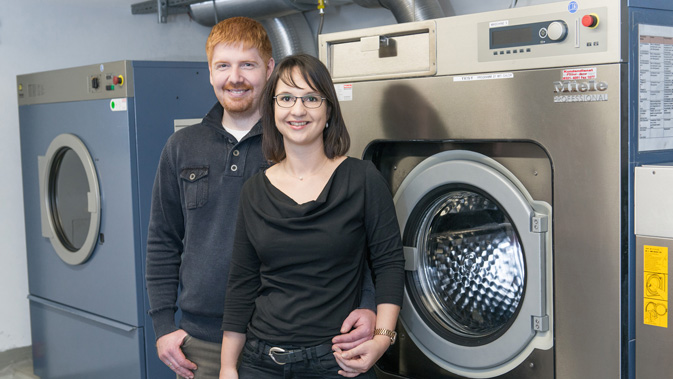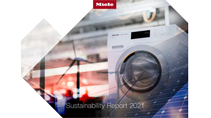Press releases
Berwanger Hof: Energy management slashes electricity costs

In-house heat generation and Miele laundry machines
With the aid of a combined heat and power plant and by connecting all electrical machines to an energy management system, hotel owner Christian Berwanger has been able to drastically cut electricity costs at his Bavarian 4-star hotel since 2010. Today, the entire operation including the guesthouse is run on a peak-load supply of 50 kW and refurbishment costs have already almost been recuperated.
The hotel in Obermaiselstein in the Allgäu region accommodates up to 100 guests and sees itself faced with mountains of laundry on departure days. Berwanger: 'We are left with a 2 m heap of laundry and our machines have to run the whole day long to cope.' It is no wonder therefore that the laundry alone had reached 100 kW shortly before embarking on refurbishment work, regularly stretching the 60 kW allocation for the entire complex to its limits. Each additional kW from the local utility costs € 8 per month. 'We knew things just had to change or our electricity bill would have got the better of us', Berwanger summarises.
The heart and soul of the new system is energy optimisation provided by a Munich-based company called Sicotronic which connects each and every device in the laundry and kitchen with a rated load above 1 kW to their monitoring system. This detects machine conditions, registers consumption at one-second intervals and decides which machines are given precedence at any given time, even cutting off the supply to lesser needed equipment when necessary. This prevents costly peaks in load, however transient, from occurring in the first place.
Allocating priorities to individual machines was the prerogative of Mr Berwanger, the hotel proprietor. In the run-up to lunch, for instance, the ovens and ranges in the kitchen are obviously given top priority. During this period, the washing machines continue to run, but cycle times are somewhat extended as laundry must be subjected to an adequate temperature over a longer period of time. However, programmes cycles are only lengthened within a certain range so as to ensure proper operation and results. Workers in the laundry are notified of peak-load management cuts by messages which appear in the displays on washer-extractors.
Miele laundry machines have had pride of place at the Berwanger Hof for the past 45 years: The fleet currently includes a 32 kg washer-extractor and a 30 kg tumble dryer as well as a flatwork ironer able to process up to 56 kg of laundry per hour. 'There has never been a viable alternative', says Christian Berwanger: 'We have to rely on our laundry being perfectly washed and we want to have a handle on dispensing, too, as this contributes towards quality.' A good example are the towels from the spa which often need treating with grease remover to deal with the persistent stains left behind by Ayurvedic massage oils.
And as heating for guests is also a significant cost factor, the entire hotel has been heated by a unit-type combined power and heat generator for the past 4 years. Driven by a combustion engine, waste heat is fed into a tank providing hot water for central heating, showers, baths, the kitchen and the swimming pool. The motor runs on gas supplied by the neighbouring town. Apart from this, the hotel is virtually self-sufficient in terms of energy. In the event of a power outage, the entire system is isolated and run on natural gas. Should the gas supply fail, back-up oil tanks step in to cover emergencies.
Not only does the combined heat and power plant generate sufficient electricity to cover the needs of the Berwanger Hof, it also produces surplus energy, depending on the season. This is fed into the national grid – at a profit. This represents one of the reasons why these significant investments in new technology have paid their way, allowing costs to be recuperated within a short space of time. Savings are already improving the hotel's bottom line.
(672 words, 4,040 characters incl. spaces)
Company profile: Miele is the world's leading manufacturer of premium domestic appliances including cooking, baking and steam-cooking appliances, refrigeration products, coffee makers, dishwashers and laundry and floor care products. This line-up is augmented by dishwashers, washer-extractors and tumble dryers for commercial use as well as washer-disinfectors and sterilisers for use in medical and laboratory applications (Miele Professional).
The Miele company, founded in 1899, has 8 production plants in Germany as well as one plant each in Austria, the Czech Republic, China and Romania. 2013/14 turnover amounted to approx. EUR 3.22 bn with sales outside Germany accounting for around 70%. Miele is represented with its own sales subsidiaries and via importers in almost 100 countries. The Miele company, now in the fourth generation of family ownership, employs a workforce of around 17,660, 10,411 thereof in Germany. The company headquarters are located in Gütersloh/Westphalia, Germany.
Anke Schläger
+ 49 5241 89-1949
anke.schlaeger@miele.com
Media information
| Description | Download |
|---|---|

Success through energy management: Hotel owner Christian Berwanger and his wife Conny in their on-premise laundry which has been equipped with Miele machines for the past 45 years. |
|
| High Resolution JPG | |

The heart and soul of the new system: The new energy optimisation system installed by Sicotronic of Munich. The system networks and monitors all the machines in the laundry and the kitchen with a rated load of more than 1 kW. |
|
| High Resolution JPG | |

The combined heat and power unit at the Berwanger Hof generates more electricity than the hotel itself needs. Surplus energy is fed into the grid and reimbursed. |
|
| High Resolution JPG | |

The Berwanger Hof in the Bavarian village of Obermaiselstein provides accommodation to as many as 100 guests. |
|
| High Resolution JPG |


